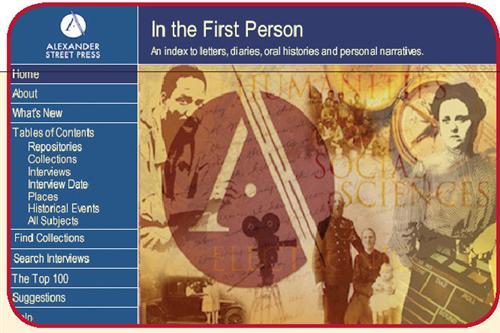Seeking to enliven your family history research with oral histories? Wondering where to find interviews others may have already recorded with your Virginia ancestors or war-veteran relatives? A new free index from Alexander Street Press, In the First Person <www.inthefirstperson.com>, is worth a look.
This “archive of social memory,” which launched in 2005, catalogs oral history materials found on the Web and maintained in repositories worldwide-saving you the trouble of locating each of those resources yourself. As of press time, In the First Person had indexed more than 16,000 interviews, with links to 8,800 full-text and some audio and video versions. Webmasters plan to add letters, diaries and autobiographies in January, with quarterly updates to follow. Additionally, the index will link to more than a half-dozen Alexander Street Press databases, including North American Women’s Letters and Diaries, and British and Irish Women’s Letters and Diaries. A drawback, however, is that you (or your local library) have to subscribe to these particular databases to access the complete first-person accounts.
Even though the site’s still in its early stages, you’ll want to get acquainted with its offerings. Begin by clicking Help to read an introduction to the database and search software. Here it recommends three ways to search the database: using the Search Interviews, Find Collections or Table of Contents option.
You’ll find the Search Interviews feature the most helpful, as it leads directly to citations and documents. Search by keyword, narrator, birth year, birth-place, occupation, interview location and topics discussed. For instance, typing World War II into the Historical Events Discussed box yields more than 1,500 interviews. Or if your great-aunt Mary worked in education, you could enter teacher into the Occupation box to find stories recounting the experiences of her fellow instructors.
The Find Collections function lets you search the database-not specific interviews or documents-by collection name, year, location, subject and more. For example, if you enter Virginia in the Narrow Subject(s) box, you’ll get a list of 39 collections, including African American Richmond: Educational Segregation and Desegregation, and Norfolk Women’s History, both of which contain transcripts of individual oral history interviews and/or audio files. Clicking on the collection name will tell you which repository holds the information as well as lead you to that organization’ Web site.
If you aren’t sure exactly what you’re looking for, the Tables of Contents option will help. It allows you to browse the site’s offerings by repository, narrator name, interview date or location, historical event or subject.
While In The First Person may not provide hard-core genealogy resources, you might get lucky and find an ancestor’s diary full of juicy family stories or an interview transcription quoting your great-great-grandfather. As the site regularly adds content and resources, it will become increasingly useful to family historians. So explore this free site now to familiarize yourself with its search features, and check back often for updates.
From the February 2006 issue of Family Tree Magazine.





